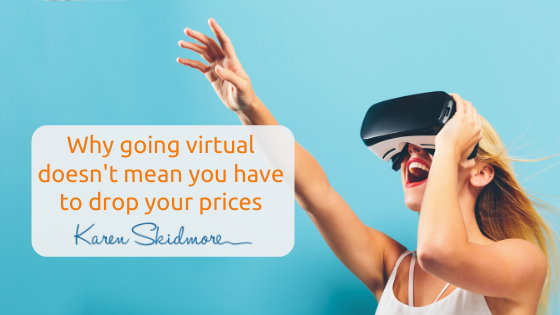We are about to go through one of the most intensely disruptive phases of how we do business. As I write this, countries across the globe have shut their borders and here in the UK, we are realistic about what’s going to happen over the coming days.
With the prospect of no longer being able to travel, many of my clients who deliver in-person training, coaching, therapy and support are being faced with cancellations and postponements of work with no real idea on when and how it’s going to happen. I have my own in-person training day coming up soon so I’m not so glib to know we simply shrug our shoulders and wait patiently for the bookings to return. This health crisis we are faced with is going to affect our businesses and some more than others.
However, this is also a huge opportunity to stretch your thinking and evaluate how you may still deliver your programmes and services, despite not being in the room with them.
When I first started up my coaching business back in 2004, it was a mix of phone coaching and face to face. At first, I believed that face to face was more powerful and I would charge less for phone call coaching. My thinking was that because I wasn’t ‘there’ for them, being on the phone somehow diminished my impact and expertise in being able to help them. I was, of course, challenged by my coach at the time (because that’s what a good coach does, yes?!) and I was able to see that the choice of delivery should never be an excuse for reducing prices. And, in fact, virtual can often be seen as a premium option.
When I teach my principles of True Profit™ Business, I actively encourage my clients to create and design a business model that fuels them. So often the need for in-person work comes up high for many spiritual, intuitive and introverted coaches, therapists and trainers. But I also see a lot of people use their fear of using technology as an excuse not to explore virtual work; especially when their industry norms are to be in the same room as their clients. Professionals such as nutritional therapists, counsellors and image consultants often tell me that their clients would expect to come and see them in person, so doing virtual sessions just wouldn’t work. But is that really the case? Or because everyone else does it this way, so you should too?
I get that for some of you who physically treat your clients, that virtual work will be far more challenging, if not impossible. But for many of you, these next few weeks could be a great opportunity to challenge your norm and explore the work that you do with your clients via platforms such as Zoom.
And just because webinars are now seen as something free to offer as a lead generation marketing tool, this does not mean you can’t charge for them. But only if you do the thinking and create the value through the experience, support and your expertise.
Going virtual doesn’t mean you need to drop your prices.
And here’s why.
- Your expertise does not diminish because of a change of platform. Just because you are not in the room with them, you don’t suddenly know less or lose a qualification.
- The experience changes but not the value. If a one day training workshop is reduced to a 90 minute webinar, yes I get that your client may expect a discount because they may be thinking about the time it takes you to deliver. Now it’s less, then they pay less. So it’s up to you to really think about the support before and after the virtual session. What can you offer to make the session more experiential? Printed workbooks sent out in the post before the event or prep work to be done before people show up to the session are two great add-ons that can be adapted from your in-person agenda. So you may charge less than a one day training but not proportionally so.
- Adding value through on-going support. Your clients need help implementing after your session so you have groups available on Facebook and LinkedIn as well as platforms such as Mighty Networks and Slack. For intimate, small groups it could even be a simple WhatsApp group as long as everyone is OK with sharing their mobile phone numbers.
- Recordings and playback. One of the huge benefits of virtual training and support is being able to record and provide your clients with the audio or video file after the event. Keep it simple to begin with. You don’t need to overcomplicate the process by signing up for big digital course platforms; share files on Dropbox or upload onto a private video hosting sites such as Vimeo.
- The convenience of availability. Don’t let the fact that you no longer have to pay for venue or catering costs reduce your pricing. The convenience to your clients means that they no longer have to travel and they have more time back in their day so that is a huge value to them. Never assume your clients are going to see this so it is up to you to highlight this in your proposition.
We are going to be experiencing some dramatic and chaotic times over the coming weeks and months and this is your opportunity to disrupt your current thinking and explore how you may continue to serve your clients, and avoid a high level of cancellations.
Yes, delivering your services and programmes virtually will need you to learn new skills and adapt your style. But for those of you who do this and learn how to deliver powerful virtual training, you are going to be in high demand in the very near future, especially so for those of you who support your clients’ health, mental and spiritual well being.
Now is the time that your clients need you more than ever.








